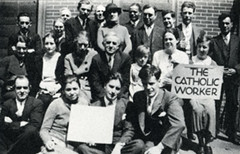The Catholic Worker
Last night Carmen Trotta, from the New York Catholic Worker, came to speak to a group of graduate and law students from NYU and other nearby universities. While his speech wasn't necessarily the best, often times drifting off for several minutes before coming back to focus, I must say that I am and have always been impressed by this organization.
Founded on May Day of 1933 by Dorothy Day, the Catholic Worker began as a newspaper and grew into ministry for the homeless that remains unrivaled. Day was a complex woman: a pacifist, an anarchist, and a devout Catholic. She sought to realize Christ's calling to clothe the naked, feed the hungry, and care for the sick by serving them on a one-on-one basis. Drawn to working class politics in her early adult life and brought into the faith later on, her conscience was informed equally by the radical politics that were current in Greenwich Village at the time and the message of compassion preached throughout the Gospels. Dorothy Day was no "social Gospel" preacher, rather she found that social action was the logical outcome of orthodox Catholic teaching. It is this logical outcome that continues to be the driving force behind the Catholic Worker to this day. With well over one hundred "houses of hospitality" throughout the United States, the Catholic Worker shines as an example of what can happen when politics become personal and when the Gospel becomes real and concrete. The paper continues to be published in New York City and tackles issues of social concern as well as important religious topics.
The greatest challenge of the day is: how to bring about a revolution of the heart, a revolution which has to start with each one of us? --Dorothy Day
Founded on May Day of 1933 by Dorothy Day, the Catholic Worker began as a newspaper and grew into ministry for the homeless that remains unrivaled. Day was a complex woman: a pacifist, an anarchist, and a devout Catholic. She sought to realize Christ's calling to clothe the naked, feed the hungry, and care for the sick by serving them on a one-on-one basis. Drawn to working class politics in her early adult life and brought into the faith later on, her conscience was informed equally by the radical politics that were current in Greenwich Village at the time and the message of compassion preached throughout the Gospels. Dorothy Day was no "social Gospel" preacher, rather she found that social action was the logical outcome of orthodox Catholic teaching. It is this logical outcome that continues to be the driving force behind the Catholic Worker to this day. With well over one hundred "houses of hospitality" throughout the United States, the Catholic Worker shines as an example of what can happen when politics become personal and when the Gospel becomes real and concrete. The paper continues to be published in New York City and tackles issues of social concern as well as important religious topics.
The greatest challenge of the day is: how to bring about a revolution of the heart, a revolution which has to start with each one of us? --Dorothy Day



1 Comments:
dorothy day was also an impressive writer. i have a book on her called the life you save may be your own. it's also on flannery o'connor, thomas merton, and someone whose name i can't remember. you should check it out if you're into that sort of thing.
Post a Comment
<< Home